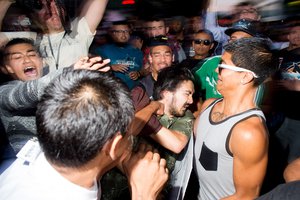- published: 02 Apr 2016
- views: 118
-
remove the playlistChocolate Slick Ii Trained And Drained
- remove the playlistChocolate Slick Ii Trained And Drained

Chocolate
Chocolate ![]() i/ˈtʃɒkᵊlət/ is a typically sweet, usually brown, food preparation of Theobroma cacao seeds, roasted and ground, often flavored, as with vanilla. It is made in the form of a liquid, paste, or in a block, or used as a flavoring ingredient in other foods. Cacao has been cultivated by many cultures for at least three millennia in Mesoamerica. The earliest evidence of use traces to the Mokaya (Mexico and Guatemala), with evidence of chocolate beverages dating back to 1900 BC. In fact, the majority of Mesoamerican people made chocolate beverages, including the Maya and Aztecs, who made it into a beverage known as xocolātl [ʃoˈkolaːt͡ɬ], a Nahuatl word meaning "bitter water". The seeds of the cacao tree have an intense bitter taste and must be fermented to develop the flavor.
i/ˈtʃɒkᵊlət/ is a typically sweet, usually brown, food preparation of Theobroma cacao seeds, roasted and ground, often flavored, as with vanilla. It is made in the form of a liquid, paste, or in a block, or used as a flavoring ingredient in other foods. Cacao has been cultivated by many cultures for at least three millennia in Mesoamerica. The earliest evidence of use traces to the Mokaya (Mexico and Guatemala), with evidence of chocolate beverages dating back to 1900 BC. In fact, the majority of Mesoamerican people made chocolate beverages, including the Maya and Aztecs, who made it into a beverage known as xocolātl [ʃoˈkolaːt͡ɬ], a Nahuatl word meaning "bitter water". The seeds of the cacao tree have an intense bitter taste and must be fermented to develop the flavor.
After fermentation, the beans are dried, cleaned, and roasted. The shell is removed to produce cacao nibs, which are then ground to cocoa mass, pure chocolate in rough form. Because the cocoa mass is usually liquefied before being molded with or without other ingredients, it is called chocolate liquor. The liquor also may be processed into two components: cocoa solids and cocoa butter. Unsweetened baking chocolate (bitter chocolate) contains primarily cocoa solids and cocoa butter in varying proportions. Much of the chocolate consumed today is in the form of sweet chocolate, a combination of cocoa solids, cocoa butter or other fat, and sugar. Milk chocolate is sweet chocolate that additionally contains milk powder or condensed milk. White chocolate contains cocoa butter, sugar, and milk, but no cocoa solids.
This article is licensed under the Creative Commons Attribution-ShareAlike 3.0 Unported License, which means that you can copy and modify it as long as the entire work (including additions) remains under this license.
Slick
Slick may refer to:
People
Musicians
Fictional characters
This article is licensed under the Creative Commons Attribution-ShareAlike 3.0 Unported License, which means that you can copy and modify it as long as the entire work (including additions) remains under this license.

Training
Training is teaching, or developing in oneself or others, any skills and knowledge that relate to specific useful competencies. Training has specific goals of improving one's capability, capacity, productivity and performance. It forms the core of apprenticeships and provides the backbone of content at institutes of technology (also known as technical colleges or polytechnics). In addition to the basic training required for a trade, occupation or profession, observers of the labor-market recognize as of 2008 the need to continue training beyond initial qualifications: to maintain, upgrade and update skills throughout working life. People within many professions and occupations may refer to this sort of training as professional development.
Types
Physical training
Physical training concentrates on mechanistic goals: training-programs in this area develop specific skills or muscles, often with a view of peaking at a particular time. Some physical training programs focus on raising overall physical fitness.
This article is licensed under the Creative Commons Attribution-ShareAlike 3.0 Unported License, which means that you can copy and modify it as long as the entire work (including additions) remains under this license.

Drained
Drained, originally titled O Cheiro do Ralo, is a 2006 Brazilian film based on a novel by Lourenço Mutarelli. It is directed by Heitor Dhalia, and stars Selton Mello. The film was produced by Geração Conteúdo, Primo Filmes & RT Features.
Plot
Lourenço is a lonely pawn shop owner. His work has made him insensitive to the suffering of those who desperately seek to sell him their personal possessions. Lourenço's lack of emotions makes him deal with the world as a collection of objects to be bought. He begins to play power games with his customers, and derives pleasure from it.
Lourenço narrates the movie, and throughout the plot he reveals his growing lust for power. The name of the movie ("The Smell from the Drain") comes from an insistent bad odour that comes from the restroom in Lourenço's office. Lourenço's lust for power is symbolized by the smell from the drain in his office. The drain smells from his feces. He slowly comes to realize that the stench from the drain comes from him. Lourenço's life changes when he becomes infatuated with a local waitress, in particular her butt. Yet, her butt becomes yet another object to him, and as with any other object, he desires to possess it. In the end, he destroys the beauty of the woman's behind by paying her to see it.
This article is licensed under the Creative Commons Attribution-ShareAlike 3.0 Unported License, which means that you can copy and modify it as long as the entire work (including additions) remains under this license.
- Loading...

-
 1:17
1:17Chocolate Labrador Puppies by Kiss X Blue 4/2/2016
Chocolate Labrador Puppies by Kiss X Blue 4/2/2016Chocolate Labrador Puppies by Kiss X Blue 4/2/2016
-

Chocolate Labrador Puppies by Kiss X Blue 4/2/2016
Chocolate Labrador Puppies by Kiss X Blue 4/2/2016
- Order: Reorder
- Duration: 1:17
- Updated: 02 Apr 2016
- views: 118
- published: 02 Apr 2016
- views: 118
- Playlist
- Chat
- Playlist
- Chat

Chocolate Labrador Puppies by Kiss X Blue 4/2/2016
- Report rights infringement
- published: 02 Apr 2016
- views: 118
Over 100 nude women pose against Donald Trump in Cleveland
Edit The Times of India 18 Jul 2016U.S. Ambassador To Turkey John Bass Categorically Denies US Role In Failed Coup
Edit WorldNews.com 18 Jul 2016Taylor Swift defends herself in latest salvo in Kanye battle
Edit NZ Herald 18 Jul 2016Baltimore Judge Clears Another Officer Of All Charges In Freddie Gray Case
Edit WorldNews.com 18 Jul 2016Will “Political Violence Contagion” Follow Trump to RNC?
Edit WorldNews.com 18 Jul 2016Crack down on ganja candy sellers: Court
Edit The Times of India 19 Jul 2016CM meets school children
Edit The Times of India 19 Jul 2016Stiliyan Petrov: ‘Magical’ European night to inspire Celtic
Edit Scotsman 19 Jul 2016Pixels Are Driving Out Reality
Edit Slashdot 19 Jul 2016Queensway Carleton proves hospital food doesn't need to be bland
Edit Canada Dot Com 19 Jul 2016How Henrik Stenson bounced back from losing a fortune
Edit Scotsman 19 Jul 2016A Genius Chocolate Birthday Cake with Super-Fluffy Chocolate Frosting
Edit Slate 18 Jul 2016Leggy Alexa Chung keeps things simple in little black dress while injecting a vampish slick ...
Edit The Daily Mail 18 Jul 2016Kinder chocolates 'don't cause cancer', UAE health experts say
Edit The National 18 Jul 2016Firefighters rescue 2 from Phoenix storm drain
Edit Times Union 18 Jul 2016Exquisite Valrhona Chocolate Mooncakes at Four Seasons Hotel Beijing (Four Seasons Hotels Inc)
Edit Public Technologies 18 Jul 201612 tiny baby quail rescued from storm drain in SLO
Edit The Tribune San Luis Obispo 18 Jul 2016Iraq's Marshes, Once Drained by Saddam, Named World Heritage Site
Edit Jakarta Globe 18 Jul 2016- 1
- 2
- 3
- 4
- 5
- Next page »







